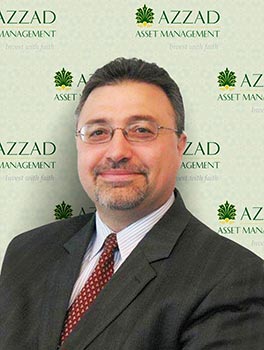
“Why don’t you invest in health insurers like Humana?” That’s a question I’ve heard recently. The short answer is that insurers of all types, whether they’re property, life or medical, do not meet the threshold requirements for investment as outlined by the Accounting and Auditing Organization for Islamic Financial Institutions (AAOIFI). The long answer takes a little more analysis. Here’s a brief explanation.
A word about gharar
Simply put, Humana and insurance companies of all sorts deal in gharar, or excessive uncertainty. This term generally refers to game of chance or speculation, or any financial transaction or contract (such as insurance) that includes an element of chance. Gharar in games or entertainment is also called maysir, or gambling, and it is the reason we don’t invest in casinos or the gaming industry at Azzad. A gharar transaction occurs where one party can benefit only by the other’s loss, under conditions of uncertainty. This is sometimes referred to as a “zero-sum game” by economists. Commercial insurance is an example of this, since either the insured pays a premium and receives no counter value, or the insurer pays out much more on a claim than was received by way of premiums.
The prohibition against investing in Humana stems from the company’s involvement in gharar and the trading of risk, in this case a type of risk that is traded based on health outcomes. The insurance company makes a bet that it can make more money from your premiums than it will lose from any medical claims that you file—or if you do represent a large financial liability, that the risk pool of all the other policyholders is large enough that it can absorb your claim. Both are gharar and thus unacceptable from an Islamic standpoint.
Incidentally, the latter point about absorbing large financial blows was the reason that many insurers endorsed the Affordable Care Act, the health care reform law commonly referred to as Obamacare. Requiring everyone to have health insurance would theoretically mean more customers and a larger risk pool.
Rule of use vs. rule of business
We’ve established that insurers deal in gharar and that this is a prohibited investment category according to Islamic Sacred Law, but you may be wondering why it’s okay to purchase insurance for personal use. That relates to our current condition of necessity (darurah) or general public need (hajah a’ammah). There are no health insurance options available to us in the US that meet the requirements of Islamic insurance, or takaful, and insurance is a basic need (not to mention a legal requirement following the passage of Obamacare). Our scholars have differentiated between the rules of use and the rules of business. Basically, what this means is that use of a prohibited item can be permitted in situations of dire need, but you can’t go into business with the intent to make money from it. The absolute prohibition on gharar relates to the rule of business. In other words, you can’t profit from it. It’s one thing to purchase gharar-based insurance out of need; it’s quite another to set up a based whose sole intent is to profit from that situation. This also applies to shareholders in such an enterprise.
There is a legal maxim that is often cited by scholars when it comes to trade:
“The traded item must be permissible without need or necessity.”
This simple phrase outlines the rulings regarding the permissibility of buying and selling insurance companies like Humana. In this case, becoming a policyholder with Humana is contingently permissible because of the need we have as a community to benefit from health insurance in the absence of genuine Islamic alternatives. Remember, there are no takaful health insurance companies out there for us to work with. It’s permissible to use health insurance from Humana only because of the public general need and/or necessity. We certainly can’t go into business as a health insurer, nor are we allowed to profit as a shareholder in the company. To trade shares of Humana would be impermissible according to Sacred Law (as outlined by AAOIFI Standard No. 26) because it would, under ordinary circumstances, not be needed or necessary.
About takaful
To learn more about the ideas behind Islamic insurance, or takaful, look no further than the mutual or cooperative insurance model that is gaining broader acceptance these days. Although not exactly the same in practice, conceptually there is a good deal of overlap. With both systems, individuals share the risk among each other and do not trade risk or profit from it. AAOIFI Standard No. 26 explains the specifics of an Islamic insurer, outlining the three main contractual relationships:
1) The musharakah (partner) relationship among the participants, which leads to the establishment of a corporate entity.
2) The relationship between the corporate entity and the fund paid into by participants. (The fund is managed by an investment manager who acts as agent.)
3) The relationship between the participants and the fund, the latter of which is initially built up through participant contributions and intermittently reduced through the payment of compensation for claims.
Whatever remains after claims have been paid is ultimately considered surplus, not profit to be collected by any of the parties.
I hope this overview gives you a little more insight into why Humana doesn’t make the cut of qualified candidates for investment here at Azzad. The criteria laid out in the major sources of Islamic jurisprudence and interpreted by qualified scholars at AAOIFI should be sufficient for those who wish to “invest with faith.”
Thank you for your continued trust and investment with Azzad.


